March 5, 2010
Category:
After a brief insurrection by their blue collar offspring, zombies, vampires have once more regained their prominence as the monster supreme, leaping out at us from every bookshelf, cinema screen and TV set. What better time then for Mark Jenkins to unleash his accomplished study of the bloodsucker legend, Vampire Forensics.
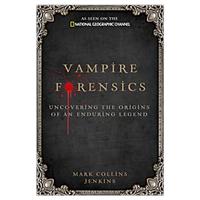
Published through National Geographic Books and accompanied by a television documentary, Vampire Forensics delves into the long history of the vampire, one which began millennia before a certain Bram Stoker set pen to parchment. Drawing upon the latest research in anthropology, archaeology, folklore and history, Jenkins dusts away centuries of revisionism and misconception to reveal the true origins of the myth.
Read on »
Posted by SciencePunk at 4:13 PM • 4 Comments • 0 TrackBacks
Category: Art
Thanks to Emilia for showing me this awesome post on the Synthgear website which shows what record grooves look like under an electron microscope. Here's a line of disco magnified 500 times:
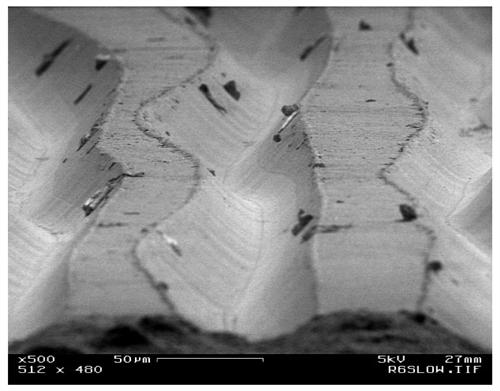
Researcher Chris Supranowitz at the University of Rochester's The Insitute of Optics took the images, one assumes for his own nerdy amusement.
Be sure to check out the full set, which includes an image in eye-popping 3D!
Posted by SciencePunk at 3:52 PM • 2 Comments • 0 TrackBacks
March 1, 2010
Category: Art
Graphic artist Philip Bond drew this awesome set of female astronauts.

You can see the whole collection on his Flickr page.
Posted by SciencePunk at 11:57 AM • 1 Comments • 0 TrackBacks
February 25, 2010
Category: Art
A set of special commemorative stamps is being launched today to celebrate the 350th anniversary of the Royal Society. The stamps feature ten of the most prominent historical fellows, as chosen by leading figures in the society today.
How many can you name? Answers below the fold!
Read on »
Posted by SciencePunk at 6:55 AM • 2 Comments • 0 TrackBacks
February 23, 2010
Category: Art • Mysterious stuff found in cameras
For my birthday I was given a vintage Super Baldina camera. A German model first manufactured in 1938, it has a coupled rangefinder and pop-out lens. At the time it cost an impressive $58 dollars, around $900 in today's money. Wow! It's very pretty.
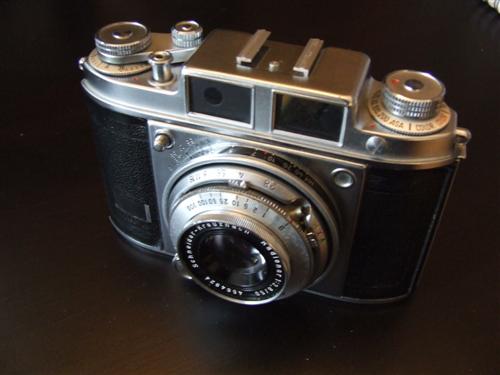
My flatmate picked it up in an antiques store for £25. That's about £25 in today's money. When I opened it to put in some film, however, I discovered a secret surprise! There was a roll of film already in the camera! Winding it up, I realised that near enough the whole film had been exposed. What could possibly be on there?
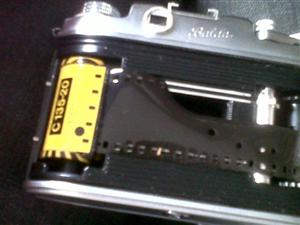
Read on »
Posted by SciencePunk at 10:11 AM • 37 Comments • 0 TrackBacks
February 19, 2010
Category: Art
Researchers at the University of Illinois, Urbana-Champaign have developed a way to compare aromas visually using specially developed inks.
Kenneth Suslick and his colleagues used tiny squares of polymer film that hold 36 drops of carefully designed dyes. These pigments change colour when exposed to various chemicals. The result is a cheap system for detecting very low concentrations of gaseous compounds. The cards can be used like a physicist's radiation dose badge to alert lab workers when they have been exposed to toxic gases.
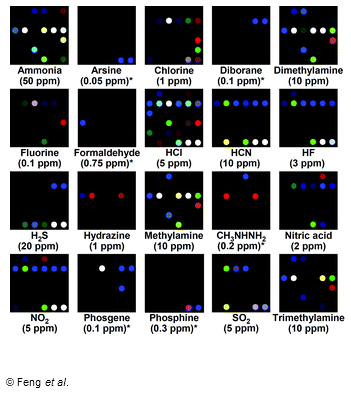
As shown above, the cards can be used to give each particular compound a unique fingerprint. This means that the system can also be used to detect subtle differences in complex aromas, such as coffee.
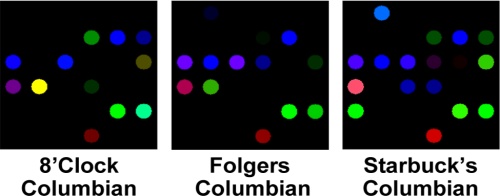
Suslick's seventeen-year-old son Benjamin carried out the research into coffee aromas, showing how the colorimeters could be used as a quick and reliable way to detect burned or spoiled batches in the food industry.
I'd love to know what other smells looked like. A giant wall poster showing a colour map of Chanel No 5 or jasmine would make a great talking point, and look gorgeous too.
Posted by SciencePunk at 11:23 AM • 6 Comments • 0 TrackBacks
February 18, 2010
Category: Art
Flickr user robherr created this fantastic image, summing up life, death, beauty, youth, age and decay in a handful of leaves.

Posted by SciencePunk at 2:58 AM • 3 Comments • 0 TrackBacks
February 16, 2010
Category:
Neatorama reports the discovery of a real life (albeit tiny) dragon!

While participating in a herpetology study we stumbled across this female laying eggs in a nest. She was found in the Lambusango Forest reserve and was immediately released after this photograph was taken.
Neatorama notes it could be related to Draco volans. No word yet on whether it breathes fire, hoards gold, or kidnaps fair maidens.
Posted by SciencePunk at 5:45 AM • 10 Comments • 0 TrackBacks
February 14, 2010
Category: General
Valentines is a time to pronounce your undying love to the geek in your life, and what better way than through the medium of maths and science?
A true geek knows that Texas Instruments says more than Hallmark ever could. Plotting a heart is a great trick if you're not good with words, or would rather let that special someone connect the dots. The Wolfram Alpha team have the formula for love right here.
If you'd prefer to express your feelings in three dimensions, Matt Parker reveals how to make a Möbius strip Valentines Card. Weird fact: It can't be cut into two halves - a delightful expression of the indivisible nature of your relationship.
If you're still a novice in the game of love, then fear not. This handy 1960s Japenese love guide has step-by-step instructions covering everything from mild snuggling to heavy petting. Just follow the arrows:
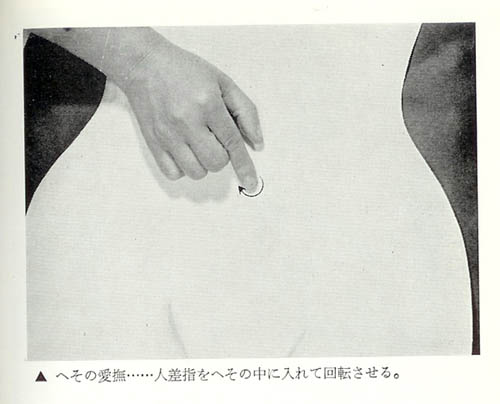
It might surprise you to learn that the Valentines focus on love and romance is mostly an obsession of the English speaking world - the day is used more generally to celebrate friendship in many other countries. How better then to sum up your feelings to your boss on Valentine's Day than with an "incredible edible chocolate anus", playfully reminding them exactly where they can press their lips to this year.
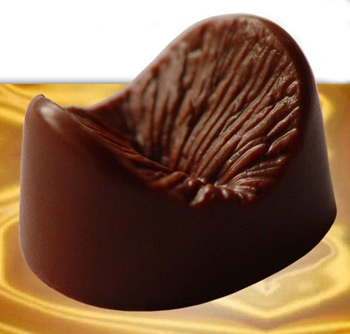
That's all from me - if you know of any more geek love fun then post your links below!
Posted by SciencePunk at 6:21 AM • 0 Comments • 0 TrackBacks


 Frank Swain is a science writer and blogger. He is based in the UK.
Frank Swain is a science writer and blogger. He is based in the UK.
 Stay in touch with Twitter
Stay in touch with Twitter




















